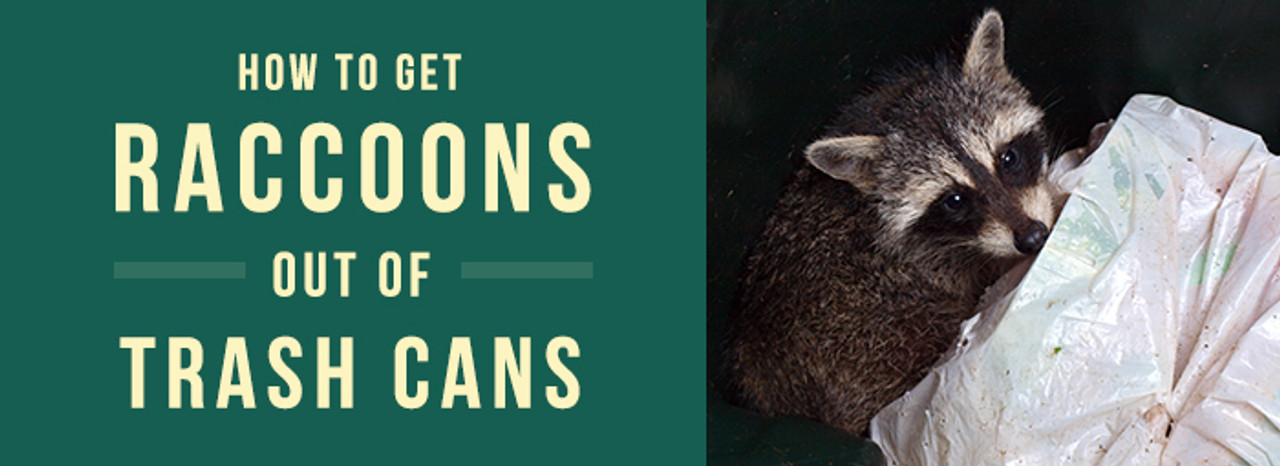Okay, so you’ve discovered a new neighbor. They are fluffy and are somewhere between the size of Tony Soprano and a small house cat. They’re in your garbage can, causing problems, eating trash, and generally making mischief. Maybe you forgot to lock the lid, maybe the wind blew it over, but now there’s a raccoon in there, and you need to do something about it.
We’re going to walk you through what you need to do to get this pesky varmint out of your garbage cans, as well as how you can keep them from coming back in the future. Let’s get started.
Don’t Panic!
Once a raccoon has been found, it will very likely flee from the confrontation, but many raccoons can be stubborn, and they don’t want to leave their cozy new home that’s chock full of food. Don’t panic! raccoons can be a real nuisance, but they don’t have to be a menace. Their tiny little fingers are very dextrous, and they can return again and again to your trash cans once they’ve found a way to open it.
Worst case scenario, a raccoon has gotten itself trapped in your garbage and it’s stuck now. You have a furry prisoner. What to do next? Don’t worry, we’ve got you covered.
Solutions
There are numerous solutions for removing a troublesome raccoon from your garbage. We’ll cover the most common solutions below, running the gamut from pacifism to laying down traps.
Be a Pacifist
One of the simplest solutions to getting rid of a raccoon that’s camped out inside a trash can is to just take the lid off and tilt the can on its side. Startling the raccoon is easy. Just give the can a kick and hopefully it will skitter off.
Make a Trail of Food
Then again, the raccoon might not leave so easily, instead opting to invite its friends and family to join in the adventure. Taking a more aggressive approach might be the name of the game, chasing it away with a broom. But, some raccoons can be scrappy little blighters, and might fight back, and you really don’t want to get into a confrontation with a mammal with sharp claws and teeth. You can also try spraying them with a hose, but that might also result in a suboptimal set of consequences.
This article is called, “how to lure a raccoon out of a garbage can,” not, “how to get bit by one,” so non-confrontation is the name of the game. An easy, non-confrontational way to get them away from the can is to create a trail of food. Here are some great suggestions:
- Meat - Racoons are omnivores, which means that they are happy to eat meat, and raw meat can be a very effective bait/ because of how easily it spoils and how available it is.
- Marshmallows - Once again, easy to find, and those raccoons do love sugar (it’s something both of our species have in common).
- Soy Sauce - Soy sauce has a really strong smell and will likely attract the raccoons pretty easily.
- Pet Food - One of the most common things a raccoon will forage for is pet food that is left sitting outdoors, so using it as bait is an easy way to lead them away from the garbage.
Set a Trap
Setting a trap is another option. Many hardware stores sell traps, cages, and the like, and it’s also a good idea to get in touch with your local animal control office to see if they have recommendations about what to do once you’ve caught the raccoon.
A few pointers on trap usage:
- Ensure you’ve gotten an adequate trap. There are many non-lethal options available that make grabbing the raccoon and releasing it safe and easy.
- Make sure that you set the trap with bait at night, just in case the raccoon is observing your behavior. They can be clever little critters.
- Determine where you’re going to drop the raccoon off the next day, whether it’s in a remote location or your local animal control office.
While we’re on the subject of animal control, if you have any concerns about trying to remove a stubborn rodent, animal control professionals are probably the best option. These folks are trained to keep themselves safe as well as the animal they’re trying to control. There might be a fee, but it’s likely worth it.
Prevention is Key
After you’ve removed your unwelcome guest, it’s time to start thinking about the future. Have you selected a trash can that’s right for the job? It's one thing to get the raccoon out, it’s another entirely to keep them from coming back. You want to make sure that you get a can that is raccoon proof and also has a lid that locks on tight, preferably with something more secure than bungee cords.
On top of getting better garbage cans (we can definitely help with that part), the use of raccoon repellents and poisons can be an additional tool in your arsenal, but make sure that you’re keeping the areas safe and secure so your pets don’t get in and accidentally ingest any repellents or poisons you’re using.
So, at the end of the day, prevention is the best policy. Keeping raccoons away requires you to make sure that your home and disposal areas aren’t fertile ground for raccoon homesteaders. Keep those baits and traps handy, check in regularly with your animal control office, and make sure that you get a raccoon proof trash can from us. All these steps combined should ensure that your home is free from tiny bandits.

